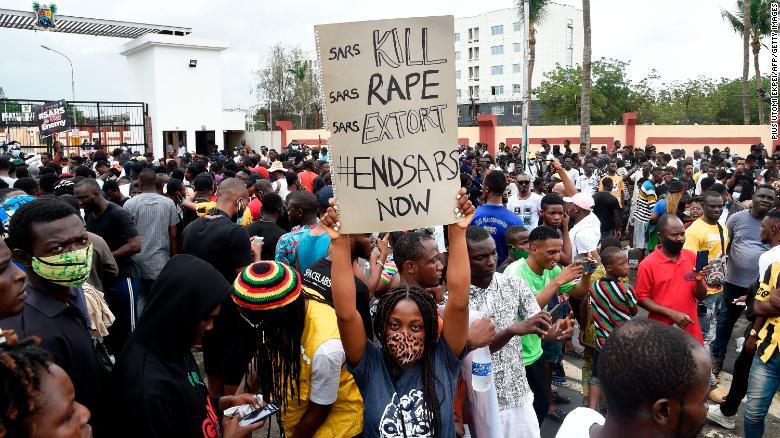

A court in Nigeria's capital city Abuja has ordered the Central Bank to unblock the accounts of 20 people who were involved in the #EndSARS protests which rocked the country last October.
Their accounts were blocked in November last year when Godwin Emefiele, Nigeria's Central Bank governor was granted an order to freeze the accounts for 90 days on suspicion of alleged money laundering, their lawyer Femi Falana told CNN.
"We informed the court that the 90-day order expired on the 4th of February, and since there was no renewal of the order, that should be the end of the case," Falana, a senior advocate, told CNN.
The Nigerian bank regulator did not provide any evidence to substantiate the claims and the suit was struck out by Justice Mohammed on Wednesday, more than three months after the accounts were blocked, Falana said.
"The court agreed with us; made an order for defreezing of the accounts and struck out the case based on the application of the counsel to the Central Bank," he added.
Falana added that no out-of-court settlement was agreed between his clients and the Nigeria Central Bank.
"There was no agreement. How can I agree with those who violated the rights of my clients?" he said. "The CBN lawyer only discussed with me.. on the need to end the case."
The veteran lawyer added that he would be challenging the decision to block the accounts.
"My clients have told me they want to go to court to challenge the freezing of their accounts for three months. We'll do that next week," Falana said.
In early October last year, thousands of young Nigerians took to the streets in major towns and cities across the country to demand the dissolution of the Special Anti-Robbery Squad (SARS) of the police force -- widely accused of extortion, harassment and the use of excessive force.
The protesters who bore placards with different inscriptions condemning police brutality, repeatedly chanted "End SARS" during the simultaneous nationwide processions.
The early days of the demonstrations were largely peaceful.
It, however, spiraled into chaos after it was hijacked by armed youths who looted and destroyed properties.
The End SARS movement reached its climax late October when military forces fired live rounds on October 20 in a bid to disperse protesters at the Lekki Toll Gate in Nigeria's commercial city Lagos.
A CNN investigation found that the army fired directly at the protesters and used live ammunition and not in the air with blank rounds as was initially claimed.
Weeks later, the Nigeria Central Bank froze the accounts of 20 protesters, including Rinu Oduala, a leading member of the movement and s a youth representative sitting on the ongoing panel investigating allegations of police brutality in Lagos State.
"The fact that no evidence was found in the so-called investigations of the CBN reiterates the point that the #EndSARS protests were peaceful," Oduala told CNN.
Her lawyer, Falana, urged the Central Bank to steer clear of political interference.
"I do hope the Central Bank will never again involve itself in what is purely a political matter, so that the bank which is supposed to be autonomous -- even of the government -- can perform its primary responsibility..," Falana said on a local TV channel Thursday.
"The president of the country has repeatedly maintained young people -- indeed all Nigerians have the right to protest peacefully, and these guys were protesting peacefully until thugs were unleashed on them in Abuja and Lagos," he added.
|